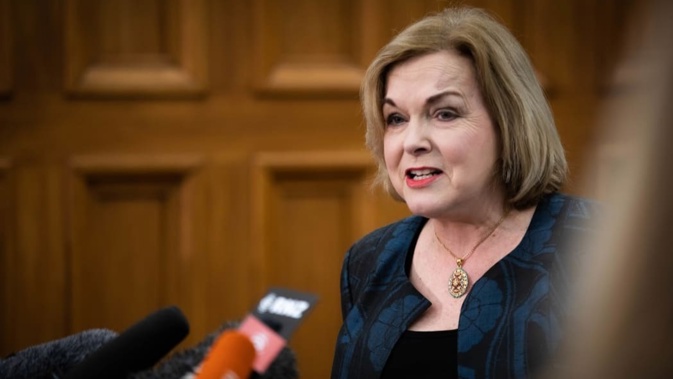
There are “increasing and compounding threats” to New Zealand’s security, the Ministry of Defence warns, with an “increasing risk of conflict directly affecting” the country’s national security.
That warning came ahead of Defence Minister Judith Collins on Wednesday announcing chiefs of the Navy, Army and Air Force – Commodore Garin Golding, Brigadier Rose King and Air Vice-Marshal Darryn Webb, respectively.
“These accomplished leaders are the New Zealand Defence Force’s [NZDF] most senior officers in their service, bringing a wealth of experience and strategic insight and being dedicated to serving our country,” Collins said
“The Government is committed to ensuring the NZDF is well-led and well-prepared to meet the challenges of an increasingly complex global security environment.”
 Judith Collins made the announcement on Wednesday. Photo / Mark Mitchell.
Judith Collins made the announcement on Wednesday. Photo / Mark Mitchell.
Golding is currently the Defence Force’s Maritime Component Commander, a role he has held since 2021.
King is the first woman to be appointed the Chief of Army. She joined the Army in 1991.
Webb is likely the most well-known of the group. He was involved in the Government’s response to Covid-19, including as the Head of Managed Isolation and Quarantine. During that stint, he featured at a number of Covid-19 press conferences. He’s been the Air Force chief since 2023.
 Air Vice-Marshal Darryn Webb. Photo / Mark Mitchell
Air Vice-Marshal Darryn Webb. Photo / Mark Mitchell
The Ministry of Defence on Tuesday released a new statement of intent, in which it said New Zealand is “facing a more challenging strategic environment than we have for decades”.
“The use, and threat of use, of military power is increasingly shaping states’ interactions.”
In this more complex environment, the ministry believes stronger relationships with “Indo-Pacific and Five Eyes partners are even more important”.
The document explicitly states that China’s “assertive pursuit of its strategic objectives is the new major driver for the new era of strategic competition among states, both globally and particularly in the Indo-Pacific”.
This isn’t the first time a New Zealand agency or minister has highlighted the more competitive global – and regional – environment, but it comes at a critical time for defence.
Defence leadership are currently devising a new plan outlining what capabilities New Zealand needs in the modern world. While the plan for investment was expected for public release sometime in the middle of this year, it’s since been delayed to either late 2024 or early next year.
The Government is also exploring whether New Zealand would want to sign on to Aukus Pillar II – the advanced technology side of the trilateral agreement between Australia, the United Kingdom, and the United States (three of the Five Eyes members). Ministers have been quick to note New Zealand hasn’t actually been invited to join yet.
The ministry’s document also mentions the ongoing conflict in Ukraine “stemming from Russia’s illegal invasion” more than two years ago “continues to have consequences for the international rules-based system”.
New Zealand has “benefited” from that system in decades, the document states.
“In recent years, growing strategic competition has challenged the effectiveness of this system,” it says.
“Some states are acting in ways counter to recognised international rules and norms, and advancing competing visions for regional and global orders that are at odds with New Zealand’s values and interests.
“This strategic competition is increasingly the backdrop for states’ relationships, and is prompting major powers and regional states to adopt more offensive postures, join new partnerships, and invest in defence and other instruments of national power.”
The ministry says that the Government expects New Zealand will contribute to global security and the reinforcement of the international rules-based system.
The document mentions New Zealand’s contributions to “peace and security” in the Middle East and Africa. Earlier this year, New Zealand deployed personnel to the Red Sea to uphold maritime security there in the face of Houthi attacks on international shipping.
Climate change is also noted as a “paramount global challenge” that is “directly affecting national and regional security” and “exacerbating strategic competition and other security threats”.
The effects of climate change and other regional security issues are expected to be canvassed by Pacific leaders at the annual Pacific Islands Forum leaders’ retreat in Tonga this week. Prime Minister Christopher Luxon touched down there on Tuesday evening.
The statement of intent also outlines three core focus areas the Minister of Defence has identified, including reinvigorating relationships with key security partners, setting a clear policy direction to increase defence capabilities, and rebuilding personnel capability.
Budget 2024 included $571 million of new funding for defence pay, equipment and upgrades, including $163 million for personnel remuneration.
Take your Radio, Podcasts and Music with you







